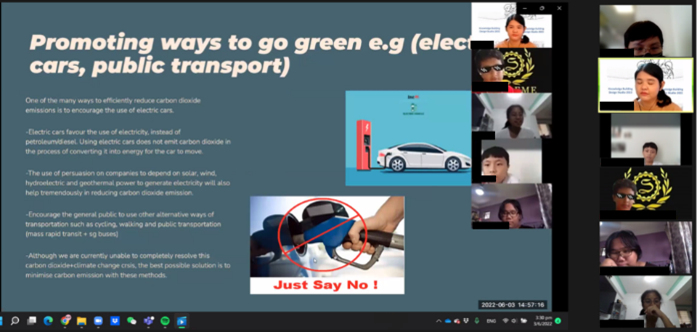Knowledge Building Design Studio (KBDS) June 2022
Sustainability - 1st to 3rd June 2022
Knowledge Building Design Studio (KBDS) June 2022 brought together over 40 teachers, students, researchers and international experts to build their knowledge on the big idea of ‘Sustainability’. The KBDS was conducted virtually over three consecutive days and participants worked together to tackle authentic problems and produce novel solutions, by producing and sharing innovative ideas to advance community knowledge. Students were able to continuously improve their ideas via ongoing collaborative discourse that was conducted on the online Knowledge Forum (KF) and breakout sessions that took place via Zoom.
Different from previous iterations of KBDS, international experts who have attended KBDS over the years were invited to share and talk with groups of students on their specific interests. This arrangement brings students directly in contact with experts in an authentic learning environment and helps to support them to develop better and improved ideas. The invited experts are:
Dr Don Philip, with Dr Ortnela and Adriano from Canada
Ms Hoe Yeen Nie, from London, England
Dr Erik Jahner, from California, US
Dr Theresa Su, from Singapore
Local student experts (Terence, Tristan, Minh Anh, and Minh Tuan)
During these focus sessions with the experts, students were able to raise and share their inquiries directly with the experts to better understand the issue from a different perspective and further improve their ideas. Over the three days, students were readily encouraged to share their journey of thinking with each other, while documenting their reflections and growth of ideas on the Knowledge Forum. Through the reflections, students identified gaps in their current knowledge, spurring them to conduct extensive research and deeper discourse with their peers in order to advance their group’s and community’s knowledge.
Students sharing their prior knowledge of sustainability on the Knowledge Forum and with the greater community.
Day 1
On the first day, students were encouraged to share their initial understanding of sustainability and the pertinent issues that they were interested to explore further on the Knowledge Forum. Based on the initial community discussion, students voiced out their interests and formed special interest groups related to various areas of sustainability. Three specific interest groups subsequently emerged with different foci, namely: Sustainable materials & energy (split into two smaller groups), Wildlife and Carbon. Students then kickstarted their discussions by sharing and selecting topics that enable them to further explore content related to their topics of interest.
Dr Don Philip, Dr Ortnela and Adriano from Canada engaging local students on their topics.
Day 2
On the second day, students continued to work on authentic problems that were identified and developed through their discussions on the first day. Experts from different fields such as sustainable healthcare to sustainable ecosystems were invited to support the students in raising inquiries and questions, further encouraging students to take on different perspectives.
Students engaging with Ms Hoe Yeen Nie on sustainable ecosystems to improve their current ideas.
Students were also given the chance to engage in cross-community discussions, where students from different groups came together to identify commonalities and probe each other’s ideas, thus helping to deepen ongoing discourse and allowing students to gain a better understanding of the underlying issues and complexities surrounding sustainability-related issues.
Day 3
On the final third day, students were given opportunities to experiment with analytical tools that can be used on their own discourse data. Ms Leanne Ma, expert analyst from the University of Toronto, then shared with students about analytics results and feedback that can be obtained when she analyzed students’ notes on the KF and further encouraged students to explore the analytical tools on their own. Throughout a short hands-on period, students were able to identify promising words in community discourse and brought them into their own group discussions for building on and development of newer connections to other concepts. As students continued working on their ideas, they also begun thinking about how they would present their ideas and strategies in a 1-minute video clip (1MC).
Expert analyst, Ms Leanne Ma, shared analytics results from student-generated discourse on Day 3.
1-minute clip (1MC) sharing
Before the end of a productive Design Studio, students from each group shared their 1MC, which were creatively developed using available tools and technologies. By using the ‘Journey of Thinking’, a concise reflection tool and set of scaffolds that helped students develop deeper thoughts and defined ideas, students and teachers in the community were able to provide constructive feedback to each other and encourage greater motivation to continue the improvement of ideas beyond the Design Studio. By listening to each other’s presentation, students identified connections across the different topics of interest leading to newer and cutting-edge ideas.
Students sharing their 1-minute video clip (1MC) with the larger community.
Students sharing their Journey of Thinking with the larger Knowledge Building community.
KBDS June 2022 has provided proof and confidence that future iterations of the Knowledge Building Design Studio should give students even more epistemic agency in controlling their own ideas, thoughts, and interests that they want to pursue.
By providing students the agency to decide their own discussion topics and choice of experts, they will believe in their own capabilities to bring forward their ideas to the community, improve the ideas, and even generate new avenues of discovery that were previously unidentified.
We truly hope that students would be able to have more of such opportunities to work on novel work and the benefits of such work can be brought to the attention of the larger community for greater and public good. We thank all participating teachers and students, international experts and researchers, and see you at the next KB Design Studio!







